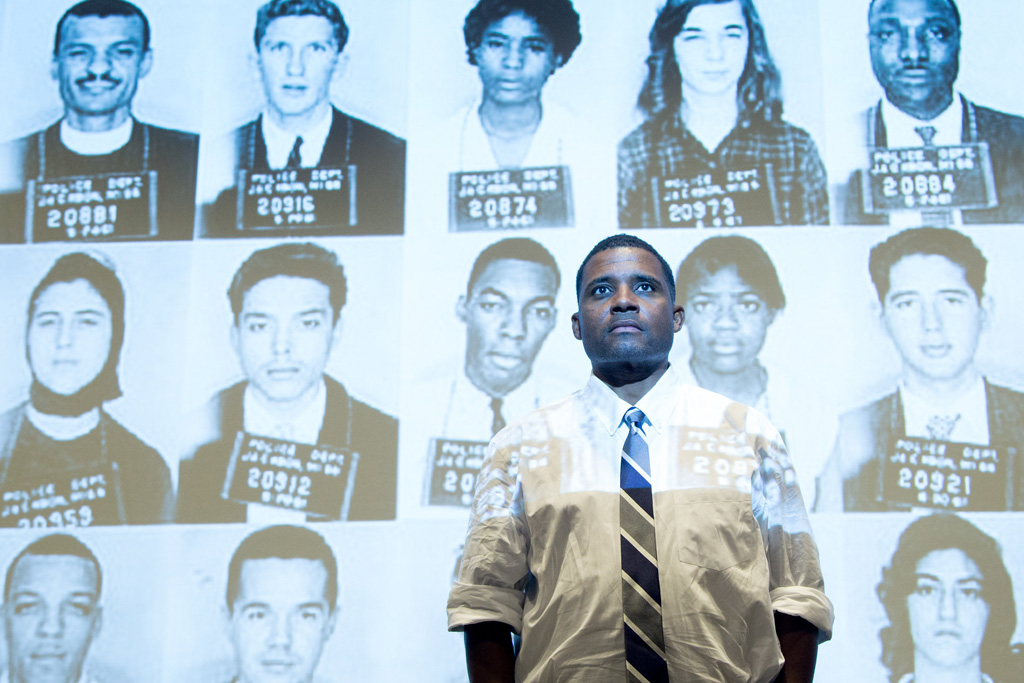Mike Wiley's solo play 'Breach of Peace' spotlights 1961 Freedom Riders at Lawrenceville Arts Center

In 1961, thirteen brave activists set out on a Greyhound bus from Washington, D.C., to New Orleans. Their demonstration of civil disobedience eventually drew hundreds of participants and national attention. This group — known as the Freedom Riders — is the focus of Mike Wiley‘s solo play “Breach of Peace.”
He’ll perform the show at Lawrenceville Arts Center on Friday, Oct. 14. Wiley joined “City Lights” host Lois Reitzes via Zoom to talk more about his theatrical exploration of this historic journey.
Interview highlights follow below.
The mission and origins of the Freedom Riders:
“Originally, it came out of the late forties and core of the Congress of Racial Equality, desire to integrate the travel systems throughout the south, particularly the southeast that was originally called the ‘Journey of Reconciliation.’ However, in the summer of 1948, the original Freedom Riders, that is to say, several of the African-American men were arrested in Chapel Hill, North Carolina, and actually placed on a chain gang for some weeks for their attempts at integrating the travel systems, bus systems and so on in the area. So that put a stop to those original Freedom Rides,” Wiley recounted.
“In late 1960 and early 1961, CORE, the Congress of Racial Equality, and James Farmer, the leader of CORE, wanted to do it again. They wanted to try it again. They thought time was right to do it, especially after the Greensboro Sit-In had sparked a new sit-in movement across the country. He wanted to change the course of history by integrating the bus and train systems across the country.”
An act of peaceful demonstration sparking brutal backlash:
“These individuals rode into the deep South, and it was a mix of Christians, agnostics, Jews, Blacks, whites, men, women, students, and adults. All rode in to the deep South, and the idea was that they were going to make it, and they knew that they was going to be trouble along the way. They got a lot more trouble than they realized that they were going to get. There was physical violence along the way, and in fact, they were bombed. The bus was bombed in Anniston, Alabama, and then down the road a little further in Birmingham, as well as Montgomery – riders were attacked and beaten in Montgomery.”
“Bobby Kennedy sent members of the military, that is, the National Guard, to protect them, which the Alabama governor was not really fond of, but he went along with it. Eventually they made it to Jackson, Mississippi, because the students, the Student Nonviolent Coordinating Committee students… pushed for it to move on. They got to Jackson, and the Jackson Police just started arresting all of them… and threw them into Parchment Penitentiary. So the Freedom Rides made it as far as Jackson, Mississippi, and uh, that became ground zero in a sense for the Freedom Rides. Everyone decided, around the country, whites and Blacks, students, adults decided, ‘Okay, well this is where we’re going. We’re going to take a bus into Jackson, and we’re going to be a part, and we’re going to get arrested.”
How Mike Wiley brings the Freedom Rides vividly to life in his performance:
“What I do is, I play multiple characters throughout the piece, and tell you the story of not just the ride into Mississippi, but the lives of these individuals – how they decided to come on the ride and what their thoughts were when they were going into some of the most dangerous situations, such as when they were riding into Birmingham, or when they were riding into Montgomery, and how it felt from their own words,” Wiley said. “These are interviews that have been done over the years of these individuals, and how it felt to look out and see this mob ready to tear them apart, whites and Blacks sitting on that bus, looking out and seeing these white mobs ready to beat them over the heads with shovels and baseball bats.”
“There are individuals that I become that there aren’t recordings or film of their voices, which, you know, I’m an actor. It’s my job to be able to make up those voices. But in order to do that, that also takes an amount of research,” Wiley explained. “Where did they live? Where did they come from? ….Where did they spend most of their childhood? These are the kinds of questions you have to ask yourself so that you get the voice right, so that you get the dialect right. These are things that I heavily researched so that I’m able to then call these pieces ‘documentary theater.'”
Mikey Wiley’s solo play “Breach of Peace” is on stage at the Lawrenceville Arts Center on Oct. 14. Tickets and more information are available at https://www.lvilleartscenter.com/eventer/breach-of-peace-public/








